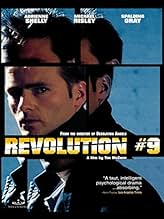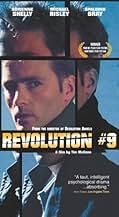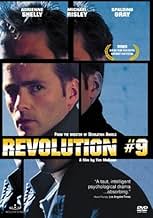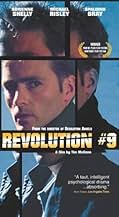Agrega una trama en tu idiomaA handsome and successful young man's life begins to unravel when he develops an acute sense of paranoia. Things escalate when Jackson is convinced that a tv ad holds sinister messages aimed... Leer todoA handsome and successful young man's life begins to unravel when he develops an acute sense of paranoia. Things escalate when Jackson is convinced that a tv ad holds sinister messages aimed at him. Is Jackson losing his mind, or are the threats real?A handsome and successful young man's life begins to unravel when he develops an acute sense of paranoia. Things escalate when Jackson is convinced that a tv ad holds sinister messages aimed at him. Is Jackson losing his mind, or are the threats real?
- Dirección
- Guionista
- Elenco
- Premios
- 2 premios ganados y 1 nominación en total
James Burton
- Therapist Fuller
- (as Jim Burton)
Phyllis Somerville
- Judge Hathaway
- (as Phyllis Sommerville)
- Dirección
- Guionista
- Todo el elenco y el equipo
- Producción, taquilla y más en IMDbPro
Opiniones destacadas
10andhowe
Revolution #9 is not a thriller, it's a gritty, affecting drama that tackles the subject of mental illness head on. Nothing is glamorized here. This is a down and dirty, sometimes blackly comic film that displays genuine talent on the part of writer/director/cinematographer Tim McCann and his extremely strong cast. Disturbing and powerful, it's a film Hollywood would never make - one of the best recent examples of why a vibrant independent film scene is so important.
10B24
Surely this is what low-budget, independent filmmaking in terms of fulfilling its potential is all about. The unique qualities that differentiate film from other dramatic media like stage plays, audio-tapes, live television, etc. are evident in this film in great abundance. I was not at all put off by recurrent multiple visions, time-lapse episodes, color variations, and other visual effects that have annoyed one or two other viewers commenting here. What is truly amazing about the film is how it takes an ensemble of little-known actors and commonplace settings and creates something powerfully dramatic without losing the verité effect of a politically and socially relevant documentary.
As others have said about the subject matter (some seem very familiar with it in clinical terms), it grabs you by the throat and won't let go even after it comes to a rather abrupt end. I, too, have known people with similar mental illnesses, and have found myself in real life playing many of the roles pictured here -- though to varying degrees and with different outcomes. A sensitive viewer may even find himself or herself identifying strongly with one or another of the characters, which is always a measure of great acting and great storytelling. This film ought to be watched from beginning to end in a dark room with no one else present to offer comments, preferably late at night when one is left at the conclusion with no option except to relive the experiences for an hour or so in complete solitude.
This is a movie that comes with no laugh track. 10 of 10.
As others have said about the subject matter (some seem very familiar with it in clinical terms), it grabs you by the throat and won't let go even after it comes to a rather abrupt end. I, too, have known people with similar mental illnesses, and have found myself in real life playing many of the roles pictured here -- though to varying degrees and with different outcomes. A sensitive viewer may even find himself or herself identifying strongly with one or another of the characters, which is always a measure of great acting and great storytelling. This film ought to be watched from beginning to end in a dark room with no one else present to offer comments, preferably late at night when one is left at the conclusion with no option except to relive the experiences for an hour or so in complete solitude.
This is a movie that comes with no laugh track. 10 of 10.
Realistic portrayal of a man's descent into mental illness coupled with sharp media satire. Speaks volumes about our society's over saturation of commercialism and suggestive imagery. Amazing performances flesh out a dark, edgy story that definitely deserves recognition.
There have been a multitude of movies that have looked at mental illness, from inside and out, but I don't know of any that has romanticized schizophrenia less than this one.
No colorful Blanche Dubois here, with her tag lines like, "I've always depended on the kindness of strangers." No stunningly gorgeous Catherine Deneuve disintegrating along with the rabbit carcasses in her apartment. No appealingly misunderstood Janet Margolin and Kear Dullea who find a way out of the maze through love. No sensational expose of the mental health system as in "The Snake Pit" and "One Flew Over the Cuckoo's Nest." Michael Risely is not a tormented genius either, nor does he win a Nobel Prize or leave a legacy of art masterpieces, music, or writing behind. And the love and support of his girl friend, Adrienne Shelley, doesn't save him -- as it wouldn't in real life.
Risley and Shelley are two ordinary people who find their lives struck by lightning. About one percent of the population will go through an episode of schizophrenia, and the ripples spread out from them, encompassing friends and family.
Risley has an ordinary personality and looks rather ordinary, as does his fiancee. He brings her a kitten in a bag full of food and tells her not to get too attached to it because he wants to get it in the pot as soon as possible. His humor is deadpan. And this flattish quality makes it more difficult for everyone, including himself, to recognize the first appearance of paranoid delusions. At first, they're minor. Somebody seems to have rearranged the items on his desk and he warns his puzzled coworkers not to do it again because it's "adolescent." Like the rest of us "normal" folk, he has a job, although it doesn't pay very well. The delusions begin to interfere with his performance at work and he loses his job. In the course of lending him support, his fiancee loses her job as well. This is how it generally works. When you are gravely disabled, you alienate your friends and family and you lose your paycheck. Now you've got money problems on top of everything else. And one of the worst places you can do this is New York City where such secondary institutions as psychiatric services are geared to provide minimally effective, impersonal custodianship under depressingly shabby conditions.
The details of Risley's descent into madness ring depressingly true. Hospitalized, he lies in his bed at night listening to a phone ringing insistently somewhere. And the director provides us with still shots of empty corridors, institutional sinks, and vacant chair seats. Nobody's home. When he tries to walk down the darkened hallway at night, for reasons unclear even to him, he is stopped by a burly black guy (aides and orderlies are disproportionately people of color) who tells him politely but very firmly to get back to his bed.
It's a first-rate script, if you're looking for naturalism. There are weaknesses in the direction -- so many shaky shots with a hand-held camera. Images that fill the screen are too often glaring closeups, making the viewer even less comfortable than he/she needs to be. The story is strong enough as it is. Sometimes when a character is speaking we see only part of his face, a jaw with a telephone receiver in front of it, or half a head, as in a commercial for a brokerage firm. There is little in the way of music, which is okay. The amplified sound track turns the drip of a faucet into a sound filled with foreboding. The lesser roles are well written too. As is usual when someone is spotted standing on the ledge of a tall building, there are people watching from the street yelling at him to go ahead and jump. None of the principal actors deliver performances that call attention to themselves. The level of competence seems to be about the same as in a made-for-TV movie. But the narrative is so strong it carries the picture along. And actually the movie, being realistic, is pretty depressing. Nobody knows what causes schizophrenia. There is clearly some genetic loading, as twin and adoption studies have demonstrated, but there's much more to it than that, because most often if one identical twin "has it," the other does not. Some prenatal or environmental trigger? No one has identified it yet. To make matters as bad as possible, schizophrenics are so wrapped up in their own illnesses that they form no bonds with their fellow sufferers. They don't have the kind of mutual support that most minority groups, like African-Americans or women, can depend on. They're socially bankrupt. A true tragedy.
No colorful Blanche Dubois here, with her tag lines like, "I've always depended on the kindness of strangers." No stunningly gorgeous Catherine Deneuve disintegrating along with the rabbit carcasses in her apartment. No appealingly misunderstood Janet Margolin and Kear Dullea who find a way out of the maze through love. No sensational expose of the mental health system as in "The Snake Pit" and "One Flew Over the Cuckoo's Nest." Michael Risely is not a tormented genius either, nor does he win a Nobel Prize or leave a legacy of art masterpieces, music, or writing behind. And the love and support of his girl friend, Adrienne Shelley, doesn't save him -- as it wouldn't in real life.
Risley and Shelley are two ordinary people who find their lives struck by lightning. About one percent of the population will go through an episode of schizophrenia, and the ripples spread out from them, encompassing friends and family.
Risley has an ordinary personality and looks rather ordinary, as does his fiancee. He brings her a kitten in a bag full of food and tells her not to get too attached to it because he wants to get it in the pot as soon as possible. His humor is deadpan. And this flattish quality makes it more difficult for everyone, including himself, to recognize the first appearance of paranoid delusions. At first, they're minor. Somebody seems to have rearranged the items on his desk and he warns his puzzled coworkers not to do it again because it's "adolescent." Like the rest of us "normal" folk, he has a job, although it doesn't pay very well. The delusions begin to interfere with his performance at work and he loses his job. In the course of lending him support, his fiancee loses her job as well. This is how it generally works. When you are gravely disabled, you alienate your friends and family and you lose your paycheck. Now you've got money problems on top of everything else. And one of the worst places you can do this is New York City where such secondary institutions as psychiatric services are geared to provide minimally effective, impersonal custodianship under depressingly shabby conditions.
The details of Risley's descent into madness ring depressingly true. Hospitalized, he lies in his bed at night listening to a phone ringing insistently somewhere. And the director provides us with still shots of empty corridors, institutional sinks, and vacant chair seats. Nobody's home. When he tries to walk down the darkened hallway at night, for reasons unclear even to him, he is stopped by a burly black guy (aides and orderlies are disproportionately people of color) who tells him politely but very firmly to get back to his bed.
It's a first-rate script, if you're looking for naturalism. There are weaknesses in the direction -- so many shaky shots with a hand-held camera. Images that fill the screen are too often glaring closeups, making the viewer even less comfortable than he/she needs to be. The story is strong enough as it is. Sometimes when a character is speaking we see only part of his face, a jaw with a telephone receiver in front of it, or half a head, as in a commercial for a brokerage firm. There is little in the way of music, which is okay. The amplified sound track turns the drip of a faucet into a sound filled with foreboding. The lesser roles are well written too. As is usual when someone is spotted standing on the ledge of a tall building, there are people watching from the street yelling at him to go ahead and jump. None of the principal actors deliver performances that call attention to themselves. The level of competence seems to be about the same as in a made-for-TV movie. But the narrative is so strong it carries the picture along. And actually the movie, being realistic, is pretty depressing. Nobody knows what causes schizophrenia. There is clearly some genetic loading, as twin and adoption studies have demonstrated, but there's much more to it than that, because most often if one identical twin "has it," the other does not. Some prenatal or environmental trigger? No one has identified it yet. To make matters as bad as possible, schizophrenics are so wrapped up in their own illnesses that they form no bonds with their fellow sufferers. They don't have the kind of mutual support that most minority groups, like African-Americans or women, can depend on. They're socially bankrupt. A true tragedy.
I've noticed that most of the comments on this film are from people who are either big fans of independent film or friends of those who have tragically sufferred from the disease portrayed by the film-makers. I am neither, and would like to recommend the film to others who consider themselves more mainstream. Yes, for a variety of reasons I won't go into (I don't want to ruin it) Hollywood might never have made this film. But that doesn't mean it isn't a gripping drama with more internal coherency than many big-budget pictures. The fact that it touches on some political issues is an added bonus to a movie that should, otherwise, appeal to open-minded but otherwise mainstream audience members. If you get a chance, check out this film, you won't regret it.
¿Sabías que…?
- Créditos curiososNo maggots were harmed during the making of this film.
- ConexionesReferences El eclipse (1962)
Selecciones populares
Inicia sesión para calificar y agrega a la lista de videos para obtener recomendaciones personalizadas
Detalles
Taquilla
- Presupuesto
- USD 300,000 (estimado)
- Total en EE. UU. y Canadá
- USD 10,133
- Fin de semana de estreno en EE. UU. y Canadá
- USD 4,936
- 17 nov 2002
- Total a nivel mundial
- USD 10,133
Contribuir a esta página
Sugiere una edición o agrega el contenido que falta































